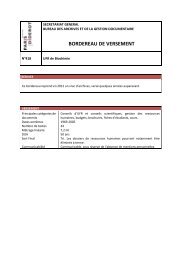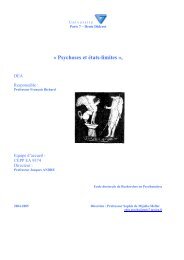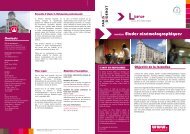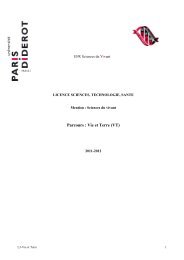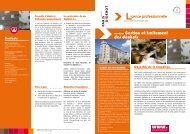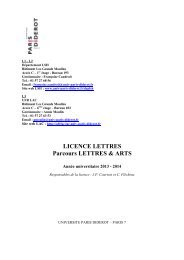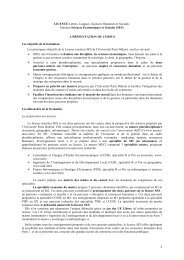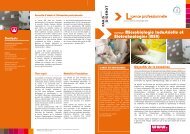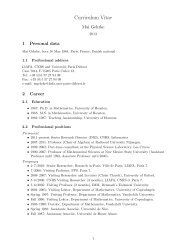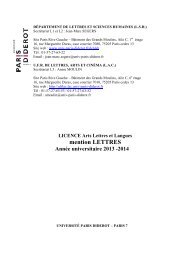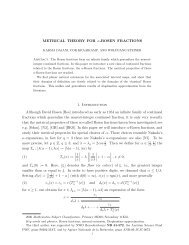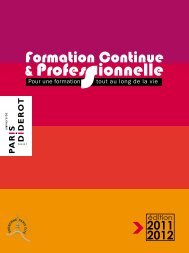Coordinator's names Carole DELPORTE-GALLET Hugues ...
Coordinator's names Carole DELPORTE-GALLET Hugues ...
Coordinator's names Carole DELPORTE-GALLET Hugues ...
Create successful ePaper yourself
Turn your PDF publications into a flip-book with our unique Google optimized e-Paper software.
– As pointed out in Task 1, our budget requests a grant for a 1-week visit per year per permanent<br />
member for a total cost of 24000 Euros.<br />
– It is expected that most of the results will be communicated to top level international conferences<br />
in distributed computing. Moreover, as explained at the beginning, it is also vitally important<br />
that the members collaborate on the project topic with the other (international) experts on the<br />
domain. The resulting cost is roughly estimated to 84000 Euros. It could be considered as rather<br />
high, but it should be taken into account that the permanent members of the Bordeaux partner<br />
published 84 papers in the major conferences of the domain in the last four years (the same<br />
duration as the project). Even without taking into consideration the collaborations with other<br />
colleagues, the participation to major workshops without refereed publications, and the missions<br />
of the non permanent staff, this could already almost justify the value of 84000 Euros for missions.<br />
• Costs justified by internal invoicies<br />
None.<br />
• Other expenses<br />
The budget concerning small material will mostly be used for providing participants with appropriate<br />
computers, and to give adequate resources to the PhDs and Post-doc involved in the project. Various<br />
expenditures will be made throughout the project duration for a total cost of 15000 Euros.<br />
7 Annexes<br />
7.1 References<br />
References<br />
[1] Dana Angluin, James Aspnes, Zoë Diamadi, Michael J. Fischer, and René Peralta. Computation in<br />
networks of passively mobile finite-state sensors. Distributed Computing, 18(4):235–253, 2006.<br />
[2] Franois Bonnet and Michel Raynal. Anonymous asynchronous systems: The case of failure detectors.<br />
In DISC 2010, pages 206–220, 2010.<br />
[3] Franois Bonnet and Michel Raynal. Consensus in anonymous distributed systems: Is there a weakest<br />
failure detector? In AINA 2010, pages 206–213, 2010.<br />
[4] Elizabeth Borowsky and Eli Gafni. A simple algorithmically reasoned characterization of wait-free<br />
computations (extended abstract). In PODC, pages 189–198, 1997.<br />
[5] Elizabeth Borowsky, Eli Gafni, Nancy A. Lynch, and Sergio Rajsbaum. The bg distributed simulation<br />
algorithm. Distributed Computing, 14(3):127–146, 2001.<br />
[6] Anne Broadbent and Alain Tapp. Can quantum mechanics help distributed computing? ACM SIGACT<br />
News - Distributed Computing Column, 39(3):67–76, September 2008.<br />
[7] Tushar Deepak Chandra, Vassos Hadzilacos, and Sam Toueg. The weakest failure detector for solving<br />
consensus. J. ACM, 43(4):685–722, July 1996.<br />
[8] Tushar Deepak Chandra and Sam Toueg. Unreliable failure detectors for reliable distributed systems.<br />
J. ACM, 43(2):225–267, March 1996.<br />
[9] Richard Cleve and Harry Buhrman. Substituting quantum entanglement for communication. Physical<br />
Review A, 56(2):1201–1204, Aug 1997.<br />
24



